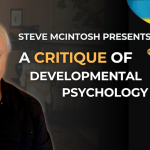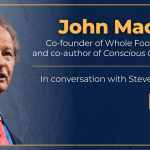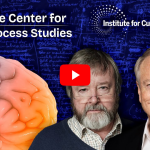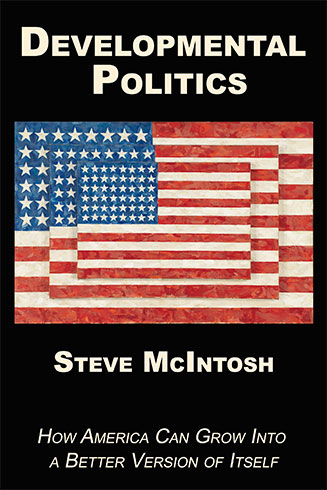My Commentary on David Sloan Wilson’s, Does Altruism Exist?
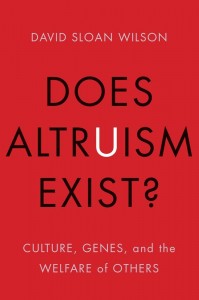 Last year I was invited to write a thousand word “commentary” on David Sloan Wilson’s recently published book Does Altruism Exist?. This commentary was solicited for Sloan Wilson’s website The Evolution Institute. However, it has been over a year, so I’m posting it here.
Last year I was invited to write a thousand word “commentary” on David Sloan Wilson’s recently published book Does Altruism Exist?. This commentary was solicited for Sloan Wilson’s website The Evolution Institute. However, it has been over a year, so I’m posting it here.
Steve McIntosh’s Commentary on David Sloan Wilson’s, Does Altruism Exist?
I’m grateful to be invited by Dr. Kurt Johnson to participate in this roundtable with distinguished evolutionary biologist Dr. David Sloan Wilson. I have followed Dr. Wilson’s writing for some time, and am especially interested in his work with The Evolution Institute. In addition to my work as a writer on integral philosophy, I am co-founder and president of a somewhat similar think tank, called the Institute for Cultural Evolution (www.culturalevolution.org). However, our approach to both conceptualizing and impacting cultural evolution differs significantly from the approach of Dr. Wilson and his Evolution Institute. Nevertheless, because we share many of the same goals, I am interested in making a connection by commenting on his new book, Does Altruism Exist?
First, I would like to commend Dr. Wilson for reaching out, not only to traditional religious groups, but now through these roundtable discussions to what is perhaps best characterized as “progressive spirituality.” Contemporary progressive spirituality represents a wide variety of views, ranging from philosophically sophisticated forms of “evolutionary spirituality” to the lamentably magical thinking of some New Age teachings. But what most forms of progressive spirituality have in common is the attempt to rediscover a sacred dimension of reality that transcends traditional forms of religion. The fact that Dr. Wilson was drawn to the “spiritual fragrance” of a progressive spiritual leader like Kurt Johnson speaks to Dr. Wilson’s intuition that progressive spirituality is worthy of his attention.
Second, I am intrigued by Dr. Wilson’s advocacy of the use of multi-level selection theory to help implement “polycentric governance” to optimize the scale of groups for each sphere of human activity. This approach to advancing cultural evolution may prove fruitful, especially if used in combination with the approach advocated by The Institute for Cultural Evolution, which involves expanding the scope of what people are able to value.
However, within the agreed limit of approximately 1,000 words, I think I can best assist Dr. Wilson’s work by offering a constructive critique pointing out areas of partiality in his thinking that need to be supplemented by a more robust appreciation of the reality of values in the development of culture and consciousness.
Although Dr. Wilson acknowledges that cultural selection pressures differ from biological selection pressures, his analysis remains within a strictly Darwinian or biological framework. And this obscures his recognition of the emergence of increasingly inclusive stages of value appreciation that has occurred over the course of human cultural evolution. By placing too much explanatory weight on multilevel selection theory, Dr. Wilson’s approach misses or ignores the arena wherein most of the development of culture and consciousness is actually going on—the realm of authentic meaningfulness. In short, the higher emergent domain of cultural evolution cannot be adequately understood or theorized from the vantage point of the lower domain of biological evolution.
For example, the theory of multi-level selection cannot explain why personal spiritual commitments often override not only the interests of the individual, but the interests of the group as well. As Paul Cassel writes in his recent book, Religion, Emergence and the Origin of Meaning: “The importance of ideas trumps the survival of the biological species that has ideas.” While spiritually motivated people may be severely mistaken about the reality of transcendent values such as goodness, truth, and beauty, Dr. Wilson’s background assumption—that increased biological reproduction or “secular utility” is the “ultimate cause” of the effectiveness of altruistic pro-social behavior—reduces the meaningfulness of human motivations to a merely biological end. And this flies in the face of the lived experience of the vast majority of pro-social people.
In order to adequately appreciate the role of altruism in human cultural evolution it is necessary to understand how both the motivations and actions of altruism have themselves evolved through the sequence of values-based worldviews that have emerged over the course of human history. However, Dr. Wilson writes in his blog that he is “not happy” with this view; that it is “theoretically problematic, [and] leaves vague exactly what needs to be done to achieve more enlightened forms of spirituality and action.” This inaccurate assessment of the models employed by integral philosophy in its analysis of cultural evolution shows that Dr. Wilson might benefit by looking more deeply into this field to see how it far exceeds, both empirically and theoretically, the oversimplified and problematically linear ideas promoted under the label of “spiral dynamics.”
As I argue in my 2012 book, Evolution’s Purpose, as well as in my recently published book, The Presence of the Infinite: The Spiritual Experience of Beauty, Truth, and Goodness, the “gravity” that intrinsic values exert on the consciousness of human beings must be taken into account in any analysis of cultural evolution. Taking values seriously does not mean a return to premodern notions of “Platonic forms.” But it does involve recognizing that the motivational power of intrinsic values cannot be reduced without remainder to the biological value of reproductive success.
Understanding the role of goodness in general, and altruism in particular, within human cultural evolution requires that the authentic meaningfulness of such values be taken into account on their own terms. And this requires the recognition of an authentic domain of metaphysical meaningfulness which can only be found beyond the horizon of physicalist Darwinian thinking.
Further, in order to get at what “extracts group commitment” and thus succeeds culturally, we have to appreciate how morality itself is conditioned by evolutionary emergence in culture. Understanding this kind of emergence involves more than the recognition of different levels or scales of social organization, such as the levels of family, community, nation, and globe taken into account by Dr. Wilson. The effective promotion of pro-social behavior involves seeing how people come to form new commitments to emergent ideals of morality that are better than the status quo—ideals that transcend and include the best of what has come before. And this requires a theory of value that recognizes an authentic dimension of vertical progress—a notion of “which way is up”—that goes beyond mere biological flourishing.
Obviously, this kind of critique cannot be properly made in the format of this brief roundtable commentary. And if I had more space and time, not only would I elaborate my critique of Dr. Wilson’s narrow view of the reality of values, I would also try to problematize his notion of a “social organism.” That is, to the extent that a slime mold is an “organism,” we might loosely compare this type of entity with the self-organizing propensities of cultural agreement structures. But there is a vast difference—a difference of kind—between a social “organism” and a human organism, who possesses subjective awareness, self-aware identity, and an individual will. Attempting to smoothly compare these different kinds of organisms is overly reductionistic and potentially totalitarian in its social consequences.
That being said, I wish Dr. Wilson success in his endeavors and remain open to further collaboration.


